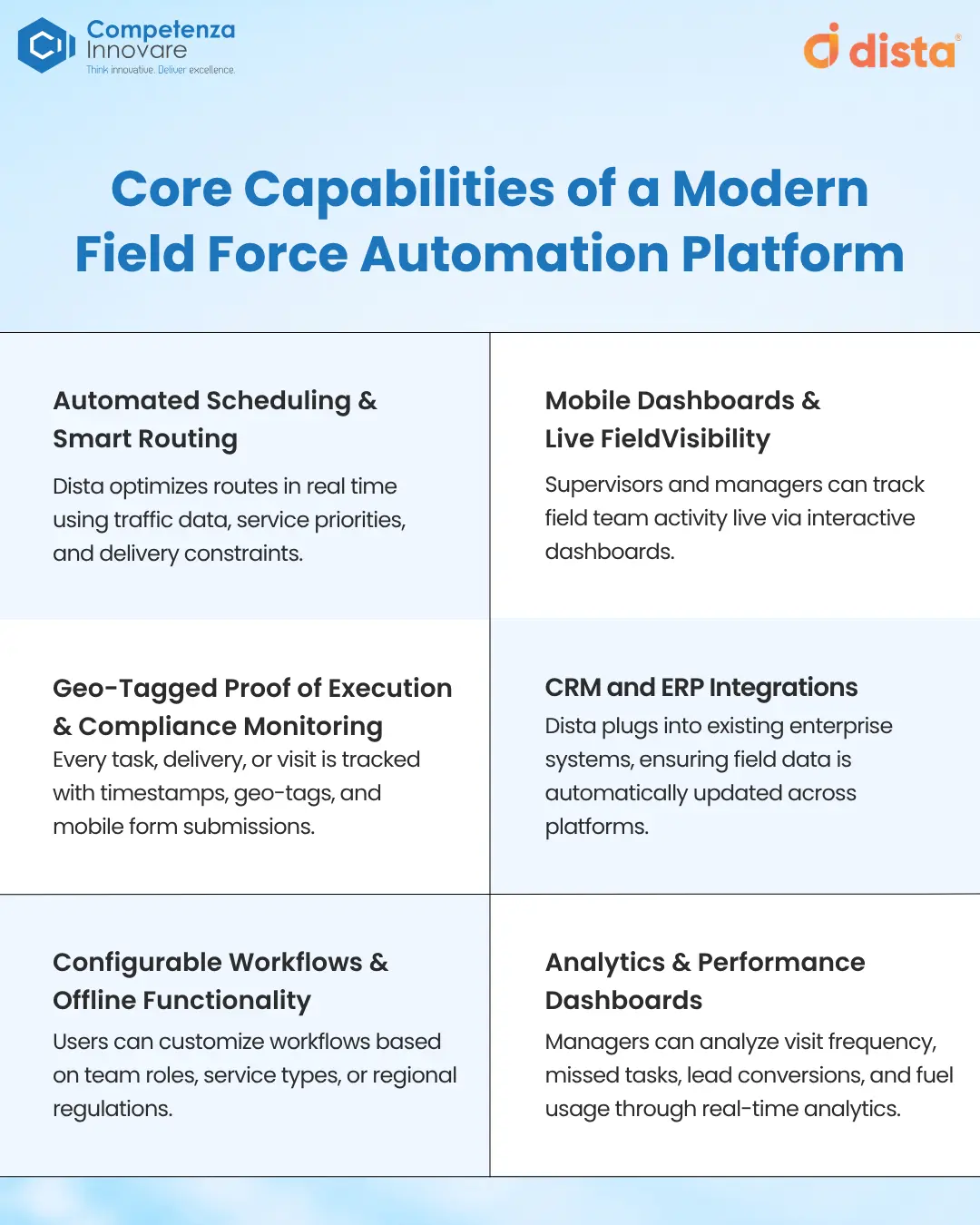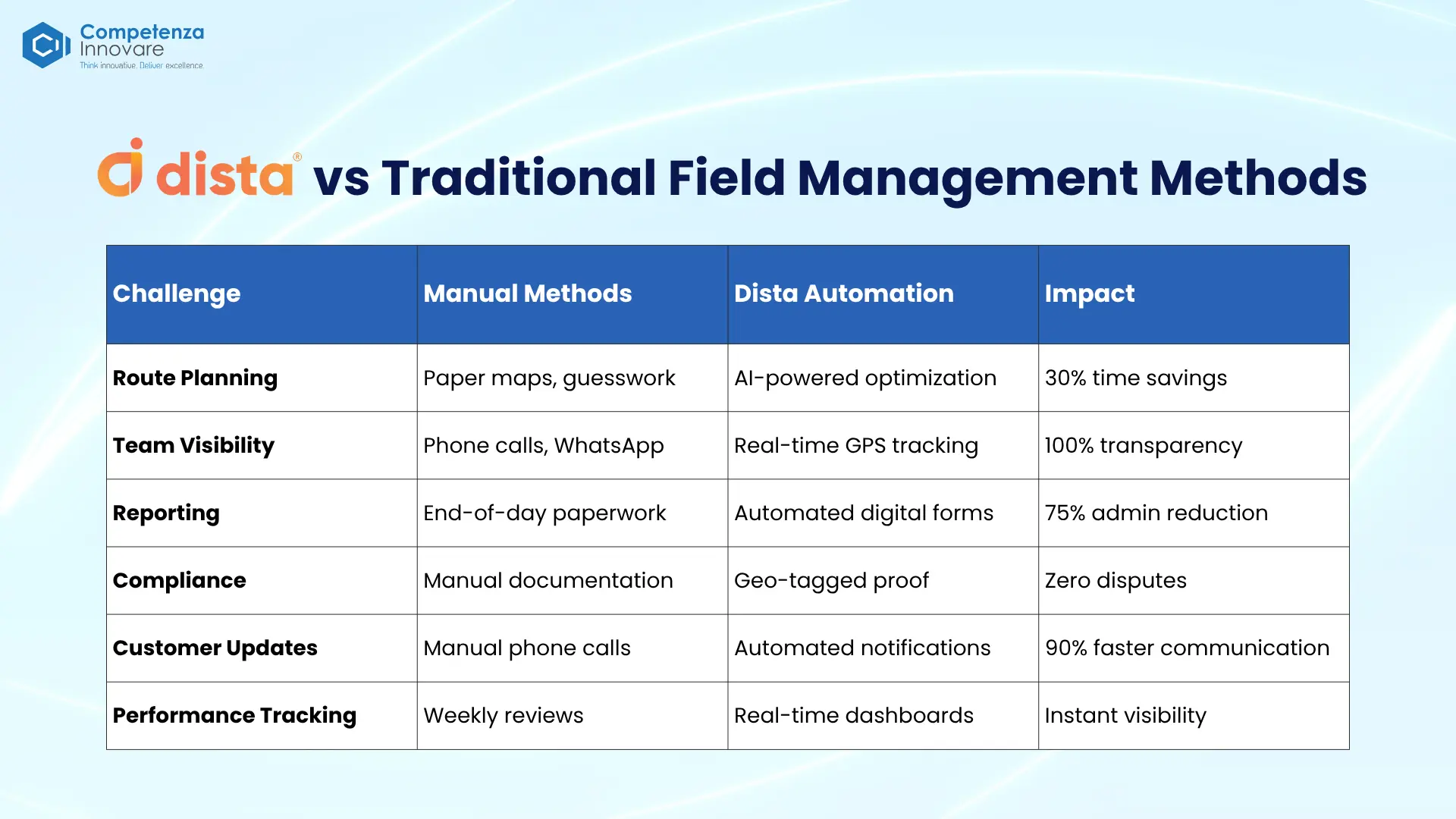Contents
- 1 At a Glance: Top Software Tech Stacks for 2025
- 2 Field Force Automation: Productivity for Mobile Teams in the GCC
- 3 What is Dista? [+Core Capabilities for Middle East Field Operations]
- 4 Use Cases of Field Force Automation in the GCC
- 5 Field Force Automation Implementation Barriers in the Middle East and How to Overcome Them
- 6 Getting Started With Field Force Automation: 5 Steps to Automate Your Field Workforce
- 7 Conclusion: Transform Your Field Operations with Dista and Competenza
- 8 FAQs
At a Glance: Top Software Tech Stacks for 2025
- Field force automation (FFA) helps logistics, sales, and healthcare teams across the Middle East improve real-time coordination, task scheduling, and last-mile efficiency.
- GCC businesses using FFA tools report up to 30% fewer delivery delays and measurable gains in workforce productivity and service quality.
- Regional initiatives such as Saudi Arabia’s Vision 2030 and UAE’s Smart Government Strategy are driving digital transformation in field operations across sectors.
- Solutions like Dista offer mobile-first field management features, including geo-tagging, route optimization, and seamless CRM and EHR integration, built to suit local business needs.
- Automating field operations enables Middle East enterprises to manage costs better, improve service timelines, and respond faster to customer and compliance demands.
Field Force Automation: Productivity for Mobile Teams in the GCC
Field force automation has transformed how Middle East businesses manage mobile workforces across logistics, sales, and healthcare sectors. Field force automation platforms equip delivery partners with mobile-first tools that streamline day-to-day field operations to deliver faster service, reduce missed deliveries, and improve customer satisfaction.
Growing digital transformation in the Middle East — explosive ecommerce growth, smart city projects, and other factors put pressure on logistics and service networks. For GCC businesses managing delivery fleets, sales representatives, or healthcare workers, Field force automation systems give a real-time control over mobile workforces like delivery drivers, sales representatives, or on-site healthcare staff.
FFA platforms help organizations achieve greater visibility, faster turnaround, and productivity gains
Automation in the field can boost sales by 30% and fuel 23% increase in productivity.
In this blog, we explore field force automation use cases, regional specifics of the Middle East, and the capabilities of Dista.
What is Dista? [+Core Capabilities for Middle East Field Operations]
Dista is an AI-powered location intelligence platform that empowers enterprises to optimize field operations and expand business coverage.
Designed for sectors like logistics, retail, pharma, BFSI, and Food & beverage. Modular architecture, mobile-first interface, and location intelligence capabilities make it adaptable for diverse field environments common in the Middle East.
1. Automated Scheduling & Smart Routing
Dista optimizes routes in real time using traffic data, service priorities, and delivery constraints.
It automates visit scheduling and ensures the most efficient deployment of field agents. This reduces travel time, cuts fuel costs, and helps meet SLAs consistently.
2. Mobile Dashboards & Live Field Visibility
Supervisors and managers can track field team activity live via interactive dashboards.
Reps receive task notifications, visit sequences, and updates on the go. All data is synced with the cloud, even with intermittent connectivity—ideal for under-networked areas.
3. Geo-Tagged Proof of Execution & Compliance Monitoring
Every task, delivery, or visit is tracked with timestamps, geo-tags, and mobile form submissions. This enables verifiable service delivery, audit trails, and adherence to compliance standards in sectors like healthcare or BFSI. Automated compliance tracking ensures audit trails meet UAE PDPL and Saudi NCA regulatory requirements.
4. CRM and ERP Integrations
Dista plugs into existing enterprise systems, ensuring field data is automatically updated across platforms. Whether it’s syncing with a retail CRM or pushing patient visit logs to a healthcare EHR, integrations are seamless and secure. Real-time synchronization eliminates duplicate data entry while maintaining data accuracy.
5. Configurable Workflows & Offline Functionality
Users can customize workflows based on team roles, service types, or regional regulations. Offline functionality ensures field teams stay productive even in low-connectivity environments.
6. Analytics & Performance Dashboards
Managers can analyze visit frequency, missed tasks, lead conversions, and fuel usage through real-time analytics. These insights drive data-backed decisions, optimize workforce allocation, and support strategic planning.

These capabilities help enterprises reduce downtime, eliminate manual reporting, improve operational visibility, and enable data-driven decision-making to drive productivity and service excellence across field operations.

Use Cases of Field Force Automation in the GCC
Field force automation systems like Dista, help solve some of the most persistent challenges in field operations—reducing delays, improving accountability, and enhancing service quality.
Use case 1: Logistics and Shipping
Challenge
Logistics teams face mounting issues of high last-mile delivery costs, poor fleet utilization, ineffective order planning, and limited visibility on the delivery lifecycle.
These inefficiencies are further amplified in the GCC region due to complex delivery geographies, dispersed customer locations, and traffic congestion in urban centers.
Without real-time tracking or route optimization, delays become frequent, costs go high, and customer satisfaction declines.
Dista Solution
Dista’s field force automation platform equips delivery agents with mobile-first tools for route planning, dynamic task allocation, and real-time tracking.
Dispatch managers get a central dashboard to monitor deliveries, reroute tasks on the fly, and manage escalations instantly. AI-powered route optimization ensures time and fuel efficiency, even in high-density or difficult terrains.
Outcome
Delivery SLAs improved by over 25% and on-ground productivity increased significantly. Businesses using Dista report fewer missed deliveries, enhanced customer satisfaction, and reduced fuel costs through intelligent routing and automated field reporting.
A financial services firm streamlined last-mile document delivery and SLA
Dista helped a financial services enterprise streamline customer onboarding and last-mile document delivery through real-time tracking and smart task allocation.
The platform enabled timely doorstep delivery, improved agent performance, and ensured SLA adherence across service zones.
Use Case 2: Field Sales Optimization
Challenge:
Field sales teams lacking proactive route planning and inconsistent performance tracking result in missed opportunities, fragmented territory coverage, and administrative overhead.
Without proactive route planning or data-driven scheduling, businesses face missed customer interactions and underserved regions.
Dista Solution
Dista’s field sales management module transforms sales operations through automation:
- Centralized sales team management with AI-driven assignment based on location, potential value, and workload
- Territory and route optimization tailored to local customer clusters and traffic patterns
- Mobile app functionality for lead capture, order placement, and digital receipts during customer visits
- Real-time visibility into rep activity, including live location tracking and daily target monitoring
Outcome
With Dista’s field sales and delivery automation, businesses have improved efficiency and market reach. The platform enables:
- Hyperlocal territory optimization through smart beat planning and geospatial insights
- Reduced customer wait times and improved first-attempt delivery success rates
- Digital zone mapping to identify under-served markets and optimize distribution
- POI-based analytics with competitor mapping, income segmentation, and demand forecasting
- Centralized monitoring for supervisors and real-time order tracking and ETA visibility for customers
A quick-service restaurant chain enhanced delivery efficiency
Dista helped a leading food delivery brand streamline operations across 300 stores and fulfill over 1.2 lakh orders per month.
The platform enabled real-time auto-allocation, centralized tracking of 600+ riders, and deep analytics via live dashboards to improve delivery efficiency and rider performance.
Use Case 3: Healthcare Field Teams
The Challenge
Healthcare providers with decentralized field operations often face inefficiencies like- delays in sample pickups, home visit coordination, or diagnostic delivery.
This negatively impacts customer satisfaction and operational throughput.
Solution
Dista’s field service automation platform helps healthcare companies streamline diagnostic logistics, manage field employees(phlebotomists, door-to-door delivery) and ensure timely interactions.
Key features include:
- Enabled real-time order assignment and task allocation based on proximity, urgency, and workforce availability
- Provided dynamic routing and live tracking for agents performing sample pickups or document deliveries
- Integrated geospatial analytics to monitor service coverage, agent performance, and SLA compliance
Outcome
These features help optimize healthcare logistics workflows, ensure timely deliveries, and offer transparency to both customers and operations teams.
- Up to 25% improvement in on-time sample collection and diagnostic deliveries
- Intelligent beat planning streamlines MRs productivity
- Greater SLA compliance with real-time status updates and live ETAs
- Complete visibility into field operations and agent utilization
- Improved healthcare service accessibility for remote or homebound patients
A leading pharmaceutical brand improved field coverage and distributor visibility
Dista equipped a leading pharmaceutical brand with smart beat planning, geo-mapped distributor coverage, and real-time rep tracking. This helped their field sales team optimize visits, identify underserved pin codes, and boost market visibility with improved data-backed decision-making.
Field Force Automation Implementation Barriers in the Middle East and How to Overcome Them
Field force automation offers great benefits and potential. Despite this, Middle East businesses often face practical challenges in implementation, fragmented infrastructure, change resistance, or companies hesitating to automate field operations, fearing that will break an already existing system.
1. Limited Digital Maturity in Traditional Sectors
Many industries like construction, distribution, and low-tier retail still rely on paper-based or semi-manual systems. The shift to digital platforms is often slowed by limited internal readiness and a lack of familiarity with automation tools.
Solution:
Start with modular, easy-to-deploy platforms like Dista that allow gradual rollout and integration. Training frontline workers with mobile-first interfaces accelerates adoption and minimizes disruption.
2. Infrastructure Gaps in Remote and Rural Areas
Regions outside of urban centers may lack consistent internet or mobile network coverage, making real-time tracking and updates difficult.
Solution:
Dista supports offline functionality and sync-on-connect features, ensuring continuity of operations even in low-connectivity environments. This is especially critical for field teams in remote logistics or rural healthcare.
3. Language and Localization Barriers
Arabic-English bilingual support is essential for regional usability. Many global platforms lack this customization, causing confusion or limiting adoption.
Solution:
Choose a platform with localization capabilities including Arabic RTL support, bilingual UI, and region-specific design norms—critical for user experience in the GCC.
4. Resistance to Change from Field Teams
Field employees accustomed to manual tracking or WhatsApp coordination often resist structured tools due to perceived complexity or surveillance concerns.
Solution:
Build internal champions, clearly communicate the productivity benefits, and demonstrate how automation simplifies tasks rather than adds oversight.
5. Regulatory Compliance and Data Sovereignty Concerns
With frameworks like UAE’s PDPL and Saudi Arabia’s NCA regulations, compliance is a key concern—especially when handling personal health or financial data.
Solution:
Select platforms that comply with local data residency requirements and offer enterprise-grade security, encryption, and access control.
Getting Started With Field Force Automation: 5 Steps to Automate Your Field Workforce
Adopting a field force automation platform can transform how your mobile teams work. This shift is valuable and ensures every field interaction is trackable, optimized, and contributes to wider business goals—faster service cycles, better territory coverage and improved customer satisfaction.
Here’s a five-step action plan to ensure your FFA rollout delivers maximum impact:
1. Assess Operational Needs and Business Goals
Begin by identifying key bottlenecks in your current field operations.
Are delivery delays affecting customer satisfaction? Are sales reps missing key coverage areas?
Align your automation goals with business KPIs like cost reduction, increased coverage, or faster task closure.
2. Map Out Field Workflows and Roles
Document the daily workflows of your field teams—service visits, deliveries, sales calls—and identify where automation can bring the most value. Define user roles, permissions, reporting needs, and escalation points to ensure seamless task handovers.
3. Choose the Right FFA Solution
Select a platform like Dista that supports your industry, offers region-specific localization (Arabic UI, local compliance support), and scales as your team grows. Look for capabilities like geo-intelligent routing, mobile app support, automated reporting, and AI-based scheduling.
4. Pilot, Train, and Iterate
Run a controlled pilot with one region or department to validate impact. Invest in hands-on training for field agents and managers. Collect feedback, analyze performance gaps, and refine workflows before full deployment.
5. Monitor, Optimize, and Scale
Post-launch, continuously monitor key performance metrics—task turnaround time, agent productivity, missed appointments, etc. Use platform analytics to uncover patterns and implement ongoing improvements. Gradually expand automation to other functions like sales audits, compliance checks, or onboarding.
To start building a smarter, automated field force, contact us and explore how we can help streamline your operations and hit the ground running within 4-6 weeks.
Conclusion: Transform Your Field Operations with Dista and Competenza
Field force automation represents a critical competitive advantage for Middle East businesses seeking to optimize mobile workforce performance, reduce operational costs, and improve customer satisfaction.
With GCC digital transformation initiatives accelerating and customer expectations rising, companies that delay automation risk falling behind competitors who embrace these technologies.
Dista’s AI-powered platform, combined with Competenza’s deep regional implementation expertise, delivers measurable results for logistics, healthcare, and sales organizations across the UAE, Saudi Arabia, and Qatar.
Our clients consistently achieve 30% cost reductions and significant productivity improvements within 6-9 months of implementation.
The opportunity cost of maintaining manual field operations grows larger each day. While competitors optimize routes, automate scheduling, and provide real-time customer updates, businesses relying on paper-based processes lose market share and profitability.
Field force automation is no longer optional – it’s essential for sustainable growth in competitive GCC markets.
Success in field automation requires the right platform and implementation partner.
Dista provides the technology foundation, while Competenza brings regional expertise, localization, compliance knowledge, and proven deployment methodologies that ensure successful adoption across diverse teams.
Ready to optimize your field operations? The next step is assessing your current operations and identifying automation opportunities that deliver the highest ROI.
Contact Competenza today to explore how Dista can transform your mobile workforce management and position your business for sustained competitive advantage.
FAQs
How does field force automation improve last-mile delivery performance?
Field force automation platforms like Dista help businesses reduce failed deliveries, improve ETA accuracy, and increase delivery efficiency by using AI-powered task allocation, route optimization, and real-time tracking. This ensures better fleet utilization and faster dispatch resolution, critical for logistics and hyperlocal delivery operations in the Middle East.
Which industries in the Middle East benefit most from field force automation?
Industries such as logistics, pharmaceutical distribution, consumer goods, field sales, and healthcare see the most impact. With large mobile teams, these sectors use FFA solutions to manage tasks, optimize routes, and ensure on-time delivery or service completion—especially in high-demand regions like UAE, Saudi Arabia, and Qatar.
What makes Dista a suitable field force automation solution for GCC businesses?
Dista combines AI, location intelligence, and mobile-first design to meet the unique needs of Middle East businesses. Features like multilingual support, custom dashboards, offline accessibility, and regional integrations (e.g., local maps, telecom APIs) make it adaptable to varied field operations in sectors such as logistics, BFSI, healthcare, and utilities.
What key features should I look for in a field force management platform?
Look for AI-based auto-dispatching, real-time tracking, offline app capabilities, KPI dashboards, geofencing, and integration with CRMs or order systems. Middle East-specific capabilities—like Arabic interfaces and map-based visualizations—are essential for compliance and user adoption across regional teams.
How can my organization get started with field force automation in the GCC region?
Begin by auditing your current field operations and identifying manual pain points. Choose a platform that aligns with your goals and operational scale. With Competenza as your implementation partner, you gain access to GCC-localized tech support, integration expertise, and experience deploying platforms like Dista for high-impact results across industries.







